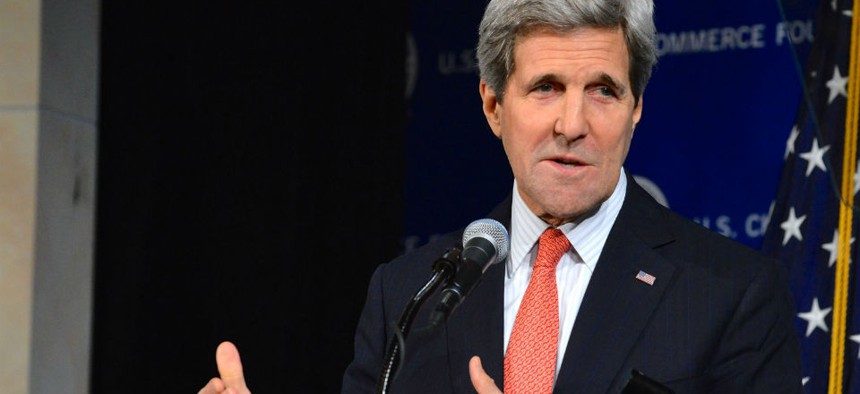
Kerry told the Senate Foreign Relations Committee that Authorization for Use of Military Force should not restrict the use of ground troops and should not limit operations to Iraq and Syria. State Department
Senators to Kerry: Tell Us What You Want to Fight ISIS
The administration criticizes Senate proposals to authorize force, but won't offer a plan of its own.
Senators from both parties pressed Secretary of State John Kerry Tuesday on the White House's reticence to put forth a proposal for the fight against the Islamic State.
And while Kerry defended the administration's refusal to outline the confines of the conflict, he also took issue with the boundaries imposed by congressional proposals. If you didn't want Congress micromanaging the war, the senators responded, you should have told us what you wanted in the first place.
Kerry testified at a hearing of the Senate Foreign Relations Committee—which he used to chair—telling members that an Authorization for Use of Military Force should include no restrictions against the use of ground troops and should not limit operations to Iraq and Syria, as the plan proposed by committee Chairman Robert Menendez does. Though the White House does not intend to violate either of those confines, the restrictions would "preemptively bind the hands of the commander in chief" if unforeseen circumstances arose, Kerry said.
"Had the administration sent us an AUMF, maybe we would have been better versed as to what the administration seeks or does not seek," Menendez responded.
Kerry and Sen. John McCain got into a tiff over historical precedent, with McCain arguing that previous AUMFs have always moved with the impetus of the executive branch, and his longtime Senate colleague disputing that characterization. "It's got to be led by the commander in chief," McCain said. "That's how the system works." Kerry said some previous such actions have in fact originated in Congress.
McCain's concerns were shared on both sides of the aisle. "I am sad that we haven't been able to work with you to craft something together," said Sen. Barbara Boxer. "I don't think we should put this off. I've gotta go on record."
Others were more forceful. After hearing Kerry's testimony on which congressional proposals the White House would support, Sen. Marco Rubio lamented that it had taken a hearing to garner that information. "You don't have anyone over there who could type that up real quick?" he asked.
"Let's not kid each other," Kerry responded. "I've been around here long enough to know that even if the president set up some language, there'd be just as many bills and just as much debate."
Tuesday's hearing will change little. Even if an AUMF passes the committee during Thursday's business meeting, no one expects the full Senate to vote on it in the lame duck. Ranking member Bob Corker said pushing the bill in the face of that reality undermines the nation's credibility, while McCain went so far as to call the hearing a "charade."
But the meeting did serve to highlight the fault lines for the AUMF debate that will surely come before the next Congress. Some, like Sens. Rand Paul and Tim Kaine, think the White House currently lacks the authority to act without congressional approval—making the lame-duck push an imperative. Menendez added his voice to their number Tuesday. "I am not comfortable with the administration's reliance" on previous AUMFs, he said. "I do not believe that it provides the authority to pursue a new enemy in a different country under different circumstances."
Kerry replied that the administration has legal standing and the backing of constitutional scholars, but would prefer to see Congress act to reinforce and update its authority. Some on the panel, including Rubio and Boxer, agreed.
Another split is over the outline of the bill itself. Some Republicans, including Rubio and Sen. John Barrasso, sided with Kerry in arguing that geographical and strategic restrictions are ill-advised for a fast-changing conflict.
Rand Paul, on the other hand, joined with most of the panel's Democrats in expressing wariness that an overly broad bill could authorize any number of unintended conflicts. "You want the unlimited authority to attack anywhere in the world where somebody pledges their allegiance to the Islamic State?" he asked. He floated a scenario in which the U.S. uses such authorization to bomb Medina or Mecca.
Kerry dismissed that hypothetical as absurd. "Nobody's talking about bombing everywhere," he said.






